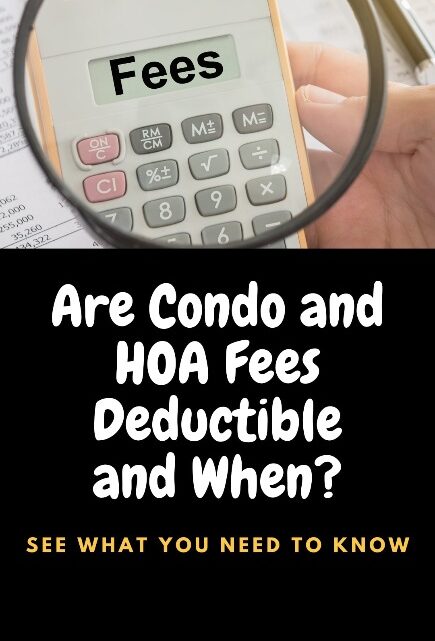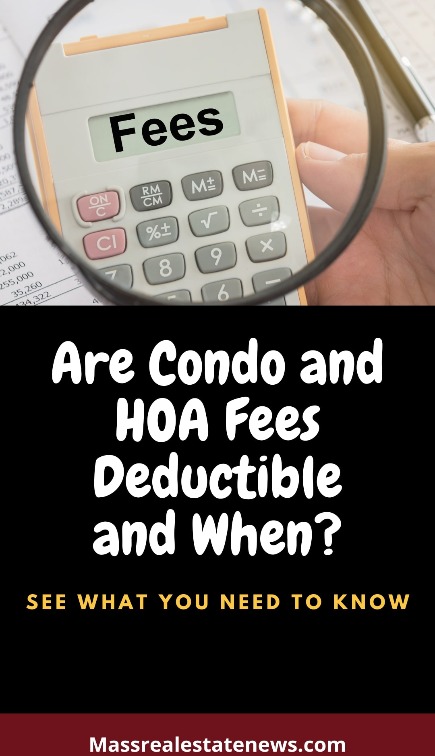Are condo fees tax deductible? Understanding the tax implications of homeowner association (HOA) fees and condo fees is crucial. Condo and HOA fees cannot be deducted when the property is your primary residence.
While there are some differences between HOA and condo fees, not regarding taxes on a primary home. They are not deductible for either. However, tax laws are different when it’s a rental property.
Determining if these fees can be deducted as rental property expenses is essential. To ensure compliance with IRS regulations, it is necessary to understand the applicable forms required for deducting HOA fees.
We will explore these topics in detail, clarifying the tax deductibility of condo fees in Massachusetts. Keep reading to find out more.
Can You Deduct HOA Fees as Rental Property Expenses?
One question that often arises regarding rental property expenses is whether HOA fees can be deducted. The answer is yes – in some cases. If you own a rental property and pay homeowner association fees, you can generally deduct them as operating expenses on your tax return. This deduction reduces your taxable rental income and can ultimately lower your overall tax liability.
It’s essential to note that the deductibility of HOA fees depends on various factors, so it’s necessary to understand the guidelines set by the Internal Revenue Service (IRS). To ensure compliance and maximize your deductions, consider the following:
Determine Eligibility
First and foremost, assess whether your rental property qualifies for the deduction of HOA fees. Rental properties used for business purposes, such as apartments, condos, or single-family homes rented out for income generation, are generally eligible. However, properties used solely as your primary residence do not qualify for this deduction.
Use as Rental Property
The key to deducting HOA fees lies in the usage of the property. To claim these fees as rental property expenses, you must demonstrate that the property is primarily used for rental purposes rather than personal use. This can involve providing lease agreements, tenant records, or other forms of documentation to support your claim.
Ordinary and Necessary Expenses
The IRS allows deductions for expenses considered ordinary and necessary for rental property operations. HOA fees typically fall within this category, as they contribute to the maintenance, management, and amenities provided to tenants.
Remember to keep thorough records and documentation to substantiate these expenses during tax filing.
Reporting on Schedule E
You must report HOA fees on Schedule E of your tax return to deduct them properly. This form is specifically designed for reporting rental property income and expenses. Include the total amount paid in HOA fees under the appropriate expense category and other costs, such as property taxes, insurance, and repairs.
You can reduce your taxable rental income by correctly reporting these expenses, potentially resulting in a lower tax bill. However, consulting with a tax professional or certified public accountant (CPA) specializing in rental property taxation is recommended to ensure accurate reporting and maximize your deductions.
Stay updated with the latest IRS guidelines and regulations related to rental property expenses, and consult a tax professional for personalized advice based on your situation.
What IRS Forms Do I Need to Deduct HOA Fees in Massachusetts?
When deducting HOA fees for your rental property in Massachusetts, you must understand the IRS forms you must complete. These forms will help you accurately report expenses and maximize tax deductions. Here are the primary IRS forms that you may need:
- Form 1040 is the standard individual income tax return form to report your rental property income and expenses. It includes various schedules and attachments to provide detailed information about your financial activities.
- Schedule E: This form is specifically for reporting rental income and expenses. It allows you to deduct various rental-related costs, including HOA fees, property taxes, insurance, and repairs. Fill out this schedule to claim your deductions correctly and accurately.
- Form 1098: If your lender pays the HOA fees on your behalf, they will send you Form 1098, which reports the amount paid. This form helps you track the expenses you can deduct from your tax return. Include this form when filing your taxes to provide supporting documentation.
Ensure you carefully review each form’s instructions to report your condo fees and other relevant expenses accurately. Also, maintain proper documentation, such as invoices or receipts, to substantiate your deductions if the IRS requires verification.
It’s worth mentioning that tax laws and forms may change over time. Therefore, staying updated with the latest IRS guidelines and consulting with a tax professional or CPA for personalized advice regarding deducting HOA fees on your rental property is crucial.
Navigating Tax Deductions With Proper Forms
When navigating the various aspects of condo fees and tax deductions, it is essential to understand the IRS guidelines and forms clearly. Whether you’re a property owner or a tax professional assisting clients, knowing how to navigate the post-tax season is crucial.
Here, we provide a comprehensive guide on the forms required for deducting HOA fees as rental property expenses.
IRS Form 1040
The first form to consider when deducting condo fees is IRS Form 1040, the U.S. Individual Income Tax Return. Individuals use this form to report their income, deductions, and credits. This form contains various sections and schedules that guide specific deductions, including rental property-related ones.
Schedule E
Within IRS Form 1040, Schedule E is where you’ll disclose income and expenses from rental real estate, including condo fees. This schedule helps calculate your net rental income or loss. It also allows for the deductions related to the property, such as property management fees, insurance premiums, and HOA fees.
Schedule A
Schedule A, titled ‘Itemized Deductions,’ may come into play when deducting HOA fees if you use the property as your primary residence and meet specific criteria. While condo fees are generally not deductible for personal use properties, they may be eligible for deduction if you pay them to cover property taxes or other expenses that typically qualify for itemized deductions.
Other Tax Forms and Considerations
In addition to Form 1040 and its schedules, other forms may need to be considered depending on your circumstances. For example, if you’re a landlord who operates as a business entity, such as a partnership or an LLC, you may need to include Form 1065 or Form 1120-S with your tax filings. These forms address the income and deductions of rental properties held within such entities.
It’s crucial to have proper documentation of your Massachusetts condo fees, such as receipts and invoices, to accurately fill out the necessary forms. Consulting with a tax professional or utilizing tax software can help you correctly complete the post-navigation of tax deductions related to condo fees.










No Comment